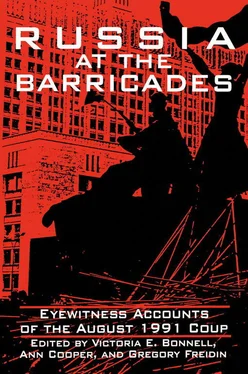Yanaev: First, I would like to do everything to ensure that the use of force against civilians is not required. We must do everything to prevent any excesses. And what we are envisaging now—some extraordinary measures—they are not at all linked with any attack on human rights. On the contrary, we want to protect human rights as much as possible. And I would like to hope very much that we will not be compelled, we will not be provoked, into using some kind of force against the civilian population.
3
Statements and Explanations by the Putschists After the Coup
Document 1: Interrogation of Defense Minister Dmitrii Yazov on August 22, 1991
In a post-coup interrogation held on August 22 by state investigators Leganov and Sychev, former Defense Minister Dmitrii Yazov confirmed that the coup attempt began when it did because the plotters wanted to prevent the signing of a new Union Treaty, a document that Yazov and his co-conspirators believed would bring the political death of the Soviet Union. Perhaps better than any other document, the interrogation shows the mentality of the people who brought the country to the brink of catastrophe. This transcript of the interrogation first appeared in Der Spiegel and was subsequently reprinted in Izvestiia (October 10, 1991). It is reproduced here in English translation with only minor omissions .
[…]
Investigator: You must understand that you are being interrogated in connection with your role in a crime that is defined as treason, conspiracy with the aim of seizing power, abuse of office. Now I would like to know how you respond to this accusation.
Yazov: I have a somewhat different view of what constitutes treason, and I don’t want to hide this. Betrayal of the President, perhaps, but I did not betray my people or my country. I have known Gorbachev for a long time. We have worked together, solved many problems together.
Personally, I like Gorbachev very much. There must have been compelling reasons for me to go against the Commander-in-Chief of our Armed Forces. Many, including myself, began developing a negative emotional attitude to Gorbachev. The reason for this was the decline in the standard of living of our people, the collapse of our economy, and the intensification of ethnic conflict and conflicts among the republics. In certain Party leadership circles, people began discussing [Gorbachev]. Gradually, the opinion emerged that Gorbachev had run his course as an active statesman. Some felt that he had either run out of steam or lost direction. His economic policy consisted of begging for foreign credits, running up foreign debt, but he did very little inside the country to repair the economy. We talked about this with Mikhail Sergeevich in the [CPSU] Central Committee and at [USSR] Supreme Soviet sessions. But he kept to the same course: solving economic problems through foreign policy. He and his government practically ignored economic problems inside the country. Our economic mechanism has grown threadbare, and the country is on the verge of disintegration. On August 20, the Union Treaty was supposed to be signed…. It became apparent to me and many other comrades with whom I discussed this matter that we were facing the disintegration of the country. Everybody had been supporting the Union of Soviet Socialist Republics, and all of a sudden we get the draft of a treaty of sovereign states!
We were convinced that this was not just a mistake but purposeful activity aimed at doing away with the Union, substituting for it a confederation of republics, each with its own president.
Investigator: […] But why did you decide to remove the President by unconstitutional means?
Yazov: I never thought that it was necessary to remove the President from power. I am guilty of this crime to the extent that my participation in all of this made it possible. I could have prevented it all; I ought to have informed the President about all of this. On Sunday, August 18, we decided that five people would fly to see him and to talk to him about a voluntary resignation, with the proviso that Vice President Yanaev would assume the function of the President. Unfortunately, I did not know Yanaev. I just supported everything without going into details. I regret all of this very much. This was, I believe, a very grave mistake.
Investigator: This sounds pretty naive, coming from an experienced statesman like you, the Minister of Defense.
Yazov: Discussions of this sort had taken place before, under different circumstances. More often than not, Comrades Kriuchkov, Baklanov, and Boldin were present at these discussions. We would talk about the situation in the country, about the disintegration of the Party, the economy, growing foreign debt, impoverishment of the people. Shouldn’t someone be responsible for all that? Gradually, we came to the conclusion that the blame for all this lay with the President of the country because, as some said, he had put distance between himself and the Party, or as others said, he had betrayed the army….
Investigator: Can you be specific about who was saying those things?
Yazov: Not really. These were just discussions. Of late, conversations tended to dwell on the fact that Gorbachev had been going on foreign tours too much in recent years, and that we often did not know what important matters he was discussing there. For example, what kind of speech did Gorbachev make in London at the G7 meeting [July 1991]? We did not have a good idea about what he was saying there. Until that time at least, we used to discuss these issues in the [CPSU] Politburo or in the Presidential Council or the Security Council.
Investigator: It was better when all these decisions were made in an open forum?
Yazov: Well, perhaps such an approach is not constructive, but all the decisions were made collectively…. Of course we were not ready to become even more dependent on the United States politically, economically, and militarily.
Investigator: So what decision did you come to?
Yazov: We had neither a plan nor a conspiracy. We just got together on Saturday….
Investigator: Who called the meeting?
Yazov: Kriuchkov.
Investigator: Where?
Yazov: At one of the military installations in Moscow, at the end of Leninskii Prospect, close to the traffic police post, on a side street. Kriuchkov called at the end of the day and said: “There is something we must discuss.” And I went there. After me, came Shenin and Baklanov…. That’s when it all began. They were saying, “Well, maybe we should go and see Gorbachev, talk to him….”
Investigator: Why were you in such a hurry? Is it because the Union Treaty was about to be signed?
Yazov: Of course, we were doing this because we were unhappy about the draft treaty, we did not want the state to fall apart. I said that I was ready to provide them with an airplane. The five people were to take off from Chkalovskoe [military airfield]: Shenin, Varennikov, Boldin, Plekhanov, and Baklanov. Plekhanov was the man who knew the entire security system there. I already understood that Kriuchkov had ordered Plekhanov to replace all the guards.
Investigator: What for?
Yazov: In order to persuade Gorbachev…. And if he refused, then we would have to take decisive measures.
Investigator: So whose idea was it—to fly there, to try and persuade Gorbachev, to break all communications, to switch the guards?
Yazov: I believe this was a collective decision. For my part, I had always been skeptical. I doubted whether we should undertake anything at all. I had my own doubts. When they came back, we were sitting in the Kremlin, in Pavlov’s office. […] Yanaev came at about 8:00 P.M. The five came at about nine…. The Committee was set up after the emissaries returned in a pretty gloomy mood from seeing Gorbachev. He had practically kicked them out. He said to them: “You must decide by yourself what you are going to do.” So when they reported this to us, when they told us that they had shot their wad, that the original idea was unrealizable, then it became clear: Yanaev would have to sign the paper. Since Gorbachev was not sick, we were, first, to declare him sick. That’s when we realized that our original plan had collapsed.
Читать дальше












